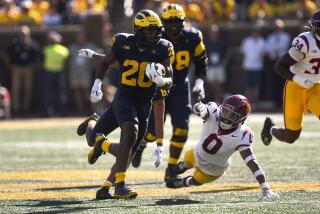Peyton Manning: When will the Colts’ QB get back in the game?
Indianapolis Colts quarterback Peyton Manning may not be ready to play Sunday’s opener, team officials announced this week. The news has fans wondering what’s keeping Manning out of the game against the Houston Texans -- ending his 227-game streak -- and how long it might take him to recover.
Manning on May 23 had surgery for a herniated disc in the back of his neck that was pressing on a nerve -- while the NFL lockout was in full swing and his access to the team’s doctors was reportedly somewhat limited.
Could Manning be out for the season?
“I honestly don’t know,” said Colts vice chairman Bill Polian in a radio interview. “The doctors tell you that these things have a way of speedily recovering when the nerve regenerates, but you have no way of knowing when it will. ... They have all seen signs of improved function, which would indicate that it’s going to come back, and no one doubts that, but there’s no way to put a date on it.”
The minimally invasive surgery, called a microdiscectomy, was meant to ease pressure on the pinched nerve. (It was Manning’s second such surgery; the first was in February 2010.) At the time of the most recent operation, it was thought that quarterback would likely take just six to eight weeks to heal.
But now, more than three months after the procedure, Manning’s return to the game has been thrown into doubt. He had reportedly had weakness in his arm and pain in his lower back during limited practice sessions last week.
At the moment, there are a lot of unknowns in the Manning case. It’s unclear exactly why the healing process is taking longer than initially predicted, whether the problem is related to his previous disc issues, and what exactly are the extent and nature of his symptoms.
Assuming the problem is with the same herniated disc that had pinched the nerve and was operated on in late May, it’s possible that the nerve still needs time to heal, said Dr. Neel Anand, director of orthopedic spine surgery at Cedars-Sinai Medical Center.
“It’s very similar to trying to save people in an earthquake who are buried under rocks -- you want to get there as fast as you can and free the pressure on these people,” Anand explained. The same was true of nerves trapped by discs, he said. “The longer the pressure is there, the lesser the chance of survival of those nerves.”
As with the trapped people in that earthquake scenario, the more intense the pressure on the nerve, the more damage sustained. And the extent of that initial damage becomes clear over time, during the recovery process.
It may be that some of the nerve cells -- presumably in the tricep area, a muscle in the back of the upper arm used in throwing motions -- simply haven’t yet recovered, Anand said, and will need more time to do so.
Most people may not even notice that there’s anything wrong with their arm in the wake of a pinched-nerve recovery, Anand said -- but in a top-notch professional football player, even a small reduction in power could have noticeable adverse effects.
“At his level, I think anything short of 100% is not going to be enough,” he explained. “All he can do is wait for the nerve to recover. That can take anywhere from three months to two years -- and it may not recover.”
All is not lost, however. If the weakness in his arm is here to say, Anand explained, Manning can make up for it by retraining his other arm and shoulder muscles to compensate for the underperforming tricep.
“Assuming all we’re dealing with now is a residual weakness -- if it’s not a new problem -- then that’s the best thing he can do: work out a system he’s comfortable with getting back to throwing the way he throws,” Anand said. “High-performance athletes are very good at compensating.”
Follow me on Twitter @LAT_aminakhan.
More to Read
Go beyond the scoreboard
Get the latest on L.A.'s teams in the daily Sports Report newsletter.
You may occasionally receive promotional content from the Los Angeles Times.











